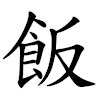飯
| ||||||||
 | ||||||||
| ||||||||
Translingual
| Stroke order | |||
|---|---|---|---|
 | |||
Han character
飯 (Kangxi radical 184, 食+4, 13 strokes in Chinese, 12 strokes in Japanese, cangjie input 人戈竹水 (OIHE), four-corner 81747, composition ⿰飠反(GHTJV) or ⿰𩙿反(K))
References
- KangXi: page 1417, character 27
- Dai Kanwa Jiten: character 44064
- Dae Jaweon: page 1941, character 21
- Hanyu Da Zidian (first edition): volume 7, page 4444, character 5
- Unihan data for U+98EF
- Unihan data for U+FA2A
Chinese
| trad. | 飯 | |
|---|---|---|
| simp. | 饭 | |
Glyph origin
| Historical forms of the character 飯 | ||
|---|---|---|
| Western Zhou | Warring States | Shuowen Jiezi (compiled in Han) |
| Bronze inscriptions | Chu slip and silk script | Small seal script |
 |
 |
 |
Phono-semantic compound (形聲, OC *bonʔ, *bons) : semantic 食 (“food”) + phonetic 反 (OC *panʔ, *pʰan).
Etymology 1
Compare Proto-Mon-Khmer *puuŋ (“cooked rice”), whence Mon ပုၚ် (pɜŋ, “cooked rice”) (Ferlus, 1988).
Pronunciation 1 is the exopassive derivation of pronunciation 2, meaning "what is eaten" (Schuessler, 2007).
Pronunciation 1
Definitions
飯
Synonyms
Pronunciation 2
Compounds
|
|
|
Pronunciation
Synonyms
References
- “飯”, in 漢語多功能字庫 (Multi-function Chinese Character Database), 香港中文大學 (the Chinese University of Hong Kong), 2014–
- “Entry #9249”, in 臺灣閩南語常用詞辭典 [Dictionary of Frequently-Used Taiwan Minnan] (in Chinese and Min Nan), Ministry of Education, R.O.C., 2011.
Japanese
| Shinjitai | 飯 | |
| Kyūjitai [1] |
飯 飯or 飯+ ︀? |
 |
| 飯󠄀 飯+ 󠄀?(Adobe-Japan1) | ||
| 飯󠄄 飯+ 󠄄?(Hanyo-Denshi) (Moji_Joho) | ||
| The displayed kanji may be different from the image due to your environment. See here for details. | ||
Readings
Compounds
Etymology 1
| Kanji in this term |
|---|
| 飯 |
| はん Grade: 4 |
| kan’on |
(This etymology is missing or incomplete. Please add to it, or discuss it at the Etymology scriptorium.)
Pronunciation
- IPA(key): [hã̠ɴ]
Noun
飯 • (han)
This term needs a translation to English. Please help out and add a translation, then remove the text {{rfdef}}.
Etymology 2
| Kanji in this term |
|---|
| 飯 |
| いい Grade: 4 |
| kun’yomi |
⟨ipi1⟩ → */ipʲi/ → /ifi/ → /iwi/ → /iː/
From Old Japanese, also used as 借音 (shakuon) kana for ⟨pi1⟩.
Derived terms
- See Japanese terms spelled with 飯 read as いい
Etymology 3
| Kanji in this term |
|---|
| 飯 |
| めし Grade: 4 |
| kun’yomi |
The 連用形 (ren'yōkei, “stem or continuative form”) of verb 召す (mesu, “to call”).[2]
Usage notes
This is an informal way to refer to food, and 食う (kuu) is a correspondingly informal way to say "eat".
Derived terms
- See Japanese terms spelled with 飯 read as めし
Derived terms
- 飯借り (mamakari)
- 飯事 (mamagoto)
- 飯子菜 (mamakona)
- 飯焚き (mamataki)
Etymology 5
| Kanji in this term |
|---|
| 飯 |
| まんま Grade: 4 |
| kun’yomi |
(This etymology is missing or incomplete. Please add to it, or discuss it at the Etymology scriptorium.)
References
- “飯”, in 漢字ぺディア (Kanjipedia) (in Japanese), 日本漢字能力検定協会, 2015—2023
- 2006, 大辞林 (Daijirin), Third Edition (in Japanese), Tōkyō: Sanseidō, →ISBN
- 1974, 新明解国語辞典 (Shin Meikai Kokugo Jiten), Second Edition (in Japanese), Tōkyō: Sanseidō
- 1960, Tetsuo Hirayama (平山輝男, editor), 全国アクセント辞典 (Zenkoku Akusento Jiten, “Nationwide Accent Dictionary”), (in Japanese), Tōkyō: Tōkyōdō, →ISBN
Korean
Vietnamese
References
- Trần (1999).
- Trần (2004).